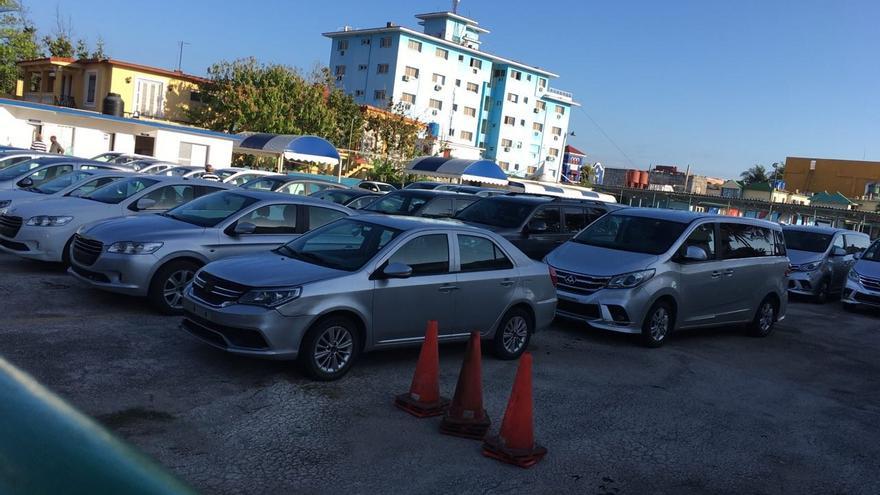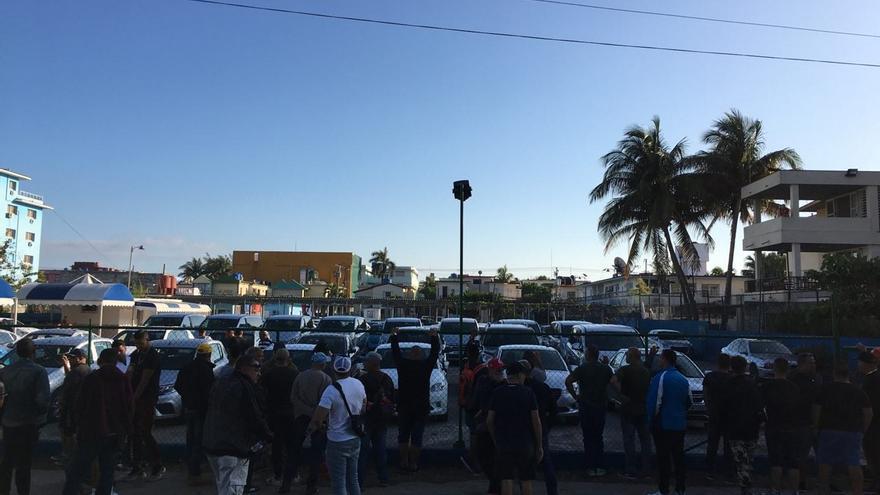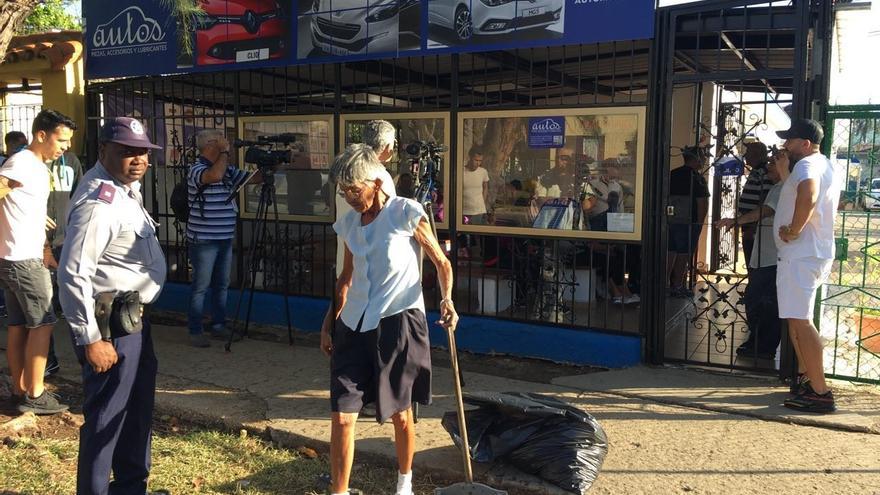anahuac85 entiempos de cambios
Tiempos de cambios: Estados Unidos, Latinoamérica y Cuba ante los problemas de Seguridad Global
viernes, 29 de enero de 2021
miércoles, 26 de febrero de 2020
Solo en Cuba es noticia la venta de autos usados
Colas y cámaras en el primer día de comercialización de vehículos en divisas
MARCELO HERNÁNDEZ,
Con la primera luz del amanecer empiezan a verse los rostros cansados y bostezos de quienes han ido formando una cola desde la madrugada. El inicio de la venta de autos de segunda mano en divisas ha atraído esta mañana a más curiosos que compradores a la tienda ubicada en la calle 20, entre 1ª y 3ª, en el municipio habanero de Playa.
"Creí que había llegado temprano, pero a las cinco ya había más de diez personas, que imagino que fueron llegando desde anoche", comenta el que es ahora primero en la fila esperando a que vuelvan a llamar a los próximos clientes. El siguiente asegura que "las mejores ofertas se acabarán en los primeros días, por eso es el desespero de la gente".

La ancha explanada donde están parqueados los carros cuenta con una oficina climatizada para atender a los clientes, donde se exhibe una lista con los precios de cada vehículo. El dato que no aparece en el listado es el año, ni el kilometraje o millaje del auto. "Si quiere conocer esos detalles, debe hacer la cola y empezar el proceso", dice a través de una rendija de la puerta un empleado.
La prensa independiente y extranjera se ha aglomerado también en el lugar. Luces, cámaras... y carros por toda la escena. Algunos se ríen de la excesiva cobertura. "Esto no es noticia en ningún lugar del mundo nada más que en Cuba", se burla un transeúnte que pasa con su hijo rumbo a la escuela.
Para entrar es indispensable mostrar la tarjeta magnética habilitada con moneda "realmente" convertible. Alguien pregunta si además es necesario que la tarjeta tenga ya la cantidad requerida para la compra y eso genera una confusión y una posterior consulta. A los pocos minutos una voz de hombre confirma. "Si va comprar de verdad, claro que tiene que tener el dinero, pero para ser atendido por el personal basta con que tenga la tarjeta".
Entre los curiosos abundan los que compiten en sabiduría automovilística mirando desde lejos y a través de la cerca. "Ninguno de esos carros parece tener más de diez años, el problema es averiguar cuántos kilómetros llevan recorridos", dice uno de los supuestos expertos, a lo que otro añade. "Y eso será difícil de saber porque el tacómetro puede manipularse y hasta dejarlo en cero kilómetros".

Casi todos los modelos que se ven son de color gris. Los hay más pequeños y otros más cercanos a la camioneta o el microbus. Algunos están cubiertos de una fina capa de polvo y ninguno lleva matrícula.
Unos señalan los modelos más baratos, que rondan los 34.000 dólares como los que probablemente se acaben más rápido, mientras otros consideran que es mejor "pagar más pero comprar un carro más fuerte". En la fila casi todos son hombres, aunque hay algunas mujeres que han venido acompañando a sus esposos y una vendedora de chucherías que pregona su mercancía.
"Cuando dieron la noticia yo pensé que iban a dejar a la gente que importara directamente", comenta un joven que aclara haber venido "solo para mirar". Su hermano, residente en Miami, tiene un auto de hace unos cinco años que ha querido mandarle "pero no hay ninguna manera de traerlo hasta aquí", añade.
La importación de los vehículos está controlada por las empresas estatales, especialmente la Corporación Cimex, un brazo comercial de los militares. "Por eso es que tienen esos precios, porque son ellos los que hacen toda la movida", opina uno de los clientes, que se suma a la conversación sobre las ventajas y desventajas de cada modelo.

La mayoría de los que aguardan parecen pertenecer a lo que ya muchos llaman "los nuevos ricos", conocidos como "macetas". El estatus social se nota en la ropa, el tipo de zapato, la manera en que alardean de sus conocimientos de autos y, claro está, en tener una tarjeta magnética con miles de dólares depositados en un país donde el salario promedio mensual no supera los 50 dólares.
A media mañana todavía no había salido un solo comprador con su auto. El trámite de revisión, prueba y entrega es largo y tedioso. "Hay que revisar hasta las bujías, porque cuando se salga de aquí quién va a poder reclamar", asegura un hombre que se ufana de ser mecánico de carros y acompaña a un amigo interesado en los Peugeots.
Aunque los autos Geely, de factura china, son más baratos algunos los rechazan por su mala reputación, ya que se han distribuido por años a precios subsidiados a militares, funcionarios y dirigentes del Partido, además de a la policía y miembros de la Seguridad del Estado.
Carlos, un joven que marcó en la cola cerca de las cuatro de la madrugada, lo explica a la perfección. "Creo que me voy a ir por un Kia de 40.000 porque aunque el Geely vale 5.000 dólares menos es un carro que da muchos dolores de cabeza para repararlo y además después voy a coger tremenda reputación de seguroso en el barrio", ironiza.
Carlos, un joven que marcó en la cola cerca de las cuatro de la madrugada, lo explica a la perfección. "Creo que me voy a ir por un Kia de 40.000 porque aunque el Geely vale 5.000 dólares menos es un carro que da muchos dolores de cabeza para repararlo y además después voy a coger tremenda reputación de seguroso en el barrio", ironiza.
Fuente: 14 y medio
domingo, 5 de octubre de 2014
Who Will Attend the OAS Presidential Summit in Panama?
By Fulton Armstrong and Eric Hershberg
OAE-OAS & tgraham / Flickr / Creative Commons Attribution-NonCommercial-ShareAlike 2.0 Generic (CC BY-NC-SA 2.0)
- Asked “if the United States is still opposed to Cuba attending.” On the Summit of the Americas, I think we’ve been pretty clear in our position on the summit, which is that obviously Panama is the host country for the summit, and as the host country they will make the decisions on invitations to that summit. … And the fact of the matter is we have said from the start that we look forward to a summit that can include a democratic Cuba at the table. We also have said that the summit process, ever since Quebec in 2001, has made a commitment to democracy, and we think that’s an important part of the summit process. But the decision about invitations is not ours to make, and obviously there’s been no invitations formally issued to the United States and other countries. And so there is no acceptance or rejection yet called for or made. …
- Asked “is there a chance that the U.S. might refuse going.” Again, I think you won’t be surprised to hear me say that we’re really not going to answer hypotheticals in the future yet. Obviously, the Summit of the Americas is in April and that’s not a situation that we can answer, although I think we have made clear that we believe the summit process is committed to democratic governance and we think that the governments that are sitting at that table ought to be committed to the summit principles, which include democratic governance. And therefore that’s our position at this point. Obviously, we have a position on Cuba which does not at this point see them as upholding those principles.
The reality is that Cuba does not conform to the Democratic Charter or to the broader OAS criteria of democratic rule, but equally real is that Latin America sees Cuba as a full member of the hemisphere and has lost all patience with those in Washington who would deny that. Either Washington — and Ottawa — set aside their objections to Cuba’s inclusion or they bid farewell to such fora and their constructive impact on regional relationships that ought to matter to them. Moreover, if they acquiesce to Cuban participation but then try to commandeer the agenda and make the Summit a seminar on democracy and human rights, it will only reinforce the widespread sense in the region that Washington cannot move beyond its obsession with the trivial matter of Cuba and get on with a serious conversation among equal partners. They would thus sacrifice an opportunity to discuss issues on which significant, substantive advances are possible through dialogue among leaders of countries throughout the hemisphere. The value of the Summit rests with the capacity of all involved to act like grownups. President Obama did so at Mandela’s funeral, and it will be telling whether he can do it again in Panama this coming April.
Source: aula blog
viernes, 26 de septiembre de 2014
Historic August for LGBT Rights in Colombia
By Juliana Martínez

Colombia Diversa / Flickr / Creative Commons Attribution-NonCommercial-ShareAlike 2.0 Generic (CC BY-NC-SA 2.0)
- It ruled in favor of step-child adoptions by gay couples. After much political, legal, and even religious debate, the Court broke a four-year silence on the highly contested issue, ruling 6 to 3 that Verónica Botero could legally adopt the biological children of her wife, Anna Leiderman. The ruling does not explicitly allow joint adoption by gay couples, but the decision cites ample scientific evidence and declares that parental homosexuality cannot be considered a risk factor for children, thus leaving the door open for further LGBT-friendly jurisprudence in the matter.
- The court recognized the gender identity of trans women by declaring that they do not have to comply with the compulsory military service required of all Colombian males. The case centered on Gracy Kelly Bermúdez, a transgender woman who filed a lawsuit against the mayor’s office in Bogotá when she was denied a job for failing to provide proof of her military service. Bermudez had not entered the military because she identifies as a woman, and therefore did not have the Military Service Registration Certificate (libreta militar) required when applying for jobs, studying at the university level or accessing health care services. She would have been exempted if she had undergone an official sex change – the right to change one’s sex has been protected in Colombia since 1993 – but this can only be legally done after undergoing sex realignment surgery, a procedure that most trans women do not have access to, cannot afford, or do not want. Therefore, despite their gender identity and expression, the legal sex of the majority of trans women continues to be “male.” The Court decided in favor of Bermúdez and ordered the mayor’s office to hire her immediately.
* Dr. Juliana Martínez teaches gender and sexuality and Latin American Literature in the Department of World Languages and Cultures at American University.
Source: Aula Blog
martes, 23 de septiembre de 2014
Back Channel to Cuba
The Hidden History of Negotiations between Washington and Havana
LeoGrande and Kornbluh have uncovered hundreds of formerly secret U.S. documents and conducted interviews with dozens of negotiators, intermediaries, and policy makers, including Fidel Castro and Jimmy Carter. The authors describe how, despite the political clamor surrounding any hint of better relations with Havana, serious negotiations have been conducted by every presidential administration since Eisenhower's through secret, back-channel diplomacy. Concluding with ten lessons for U.S. negotiators, the book offers an important perspective on current political debates, at a time when leaders of both nations have publicly declared the urgency of moving beyond the legacy of hostility.
About the Author
William M. LeoGrande, professor of government at American University, is the author of Our Own Backyard: The United States in Central America, 1977-1992, among other books.
Peter
Kornbluh, director of the Cuba Documentation Project at the National
Security Archive in Washington, D.C., is the author of The Pinochet File: A Declassified Dossier on Atrocity and Accountability, among other books.Reviews
"An exceedingly well-written and well-documented account. . . . Essential for libraries that support research into the political and diplomatic history of America foreign relations with Cuba in the latter half of the 20th century."--Library Journal Starred Review
"Told in clear prose, this richly detailed book underscores how diplomacy makes headlines, but many exchanges happen far from official negotiation tables."
--Publishers Weekly Starred Review
"LeoGrande and Kornbluh have analyzed thoroughly the history of dialogue between two countries locked in a contradictory relationship for five decades, with each side skeptical that the other truly wanted improved relations. With continual change in Washington, and continuity in Cuban leadership, the authors draw important lessons from the efforts of every administration since Eisenhower to negotiate with Cuba."
--President Jimmy Carter
"Back Channel to Cuba tells a dynamic, expansive, and anecdote-rich story drawn from compelling primary sources, interviews and declassified documents. Generational change in the ranks of Cuban leadership and transformation on the ground and in the Cuban diaspora in the United States make Back Channel to Cuba a particularly timely contribution: history can and should serve as a guide to present and future decisions about the art of the possible by Cuban and American leaders, policy makers, and citizens."
--Julia E. Sweig, author of Cuba: What Everyone Needs to Know
"A prodigious achievement--a truly exceptional examination of perhaps the most vexing relationship in the history of U.S. foreign policy. Based on vast numbers of documents, many rarely seen before, plus firsthand interviews with nearly every one of the important participants, including Jimmy Carter and Fidel Castro, Back Channel to Cuba is the equivalent of a 9' high jump when the world record is 8'04" (held since 1993, incidentally, by a Cuban). Nothing else even comes close."
--Lars Schoultz, author of That Infernal Little Cuban Republic: The United States and the Cuban Revolution
Source: UNC Press
The Hidden History of Dialogue with Cuba: What Obama Needs to Know about Talking to Havana
Monday, October 6, 2014,
9:00 – 10:30am
The Brookings Institution, Saul/Zilkha Room
1775 Massachusetts Ave, NW, Washington, DC
The Brookings Institution, Saul/Zilkha Room
1775 Massachusetts Ave, NW, Washington, DC
| For
over 50 years, U.S. and Cuban diplomats have danced a minuet of diplomacy,
meeting secretly in dingy cafeterias, elegant hotels and fancy French restaurants,
from New York to Washington, Guadalajara, Paris, London, Luanda and Havana,
to try and solve the myriad issues dividing these two perennial adversaries.
Sometimes their talks succeeded and sometimes they failed, but from Eisenhower
to Obama, every U.S. president has seen the wisdom of negotiating with
Cuba. The lessons drawn from these negotiations are especially relevant
at a time when leaders of both nations have publicly declared the urgency
of moving beyond the legacy of perpetual hostility. On October 6, the Latin America Initiative in Foreign Policy at Brookings will host William M. LeoGrande, professor of government at American University, and Peter Kornbluh, director of the Cuba Documentation Project at the National Security Archive, to present their new book, Back Channel to Cuba: The Hidden History of Negotiations between Washington and Havana. They will discuss the findings of their research, and offer recommendations to guide present and future U.S. negotiators. They will be joined by Julia E. Sweig, the Council on Foreign Relations’ Nelson and David Rockefeller senior fellow for Latin America Studies. Ted Piccone, senior fellow with the Foreign Policy Program at Brookings, will provide introductory remarks and moderate the discussion. After the program, panelists will take audience questions. |
| |||||||||||||||
Suscribirse a:
Entradas (Atom)

